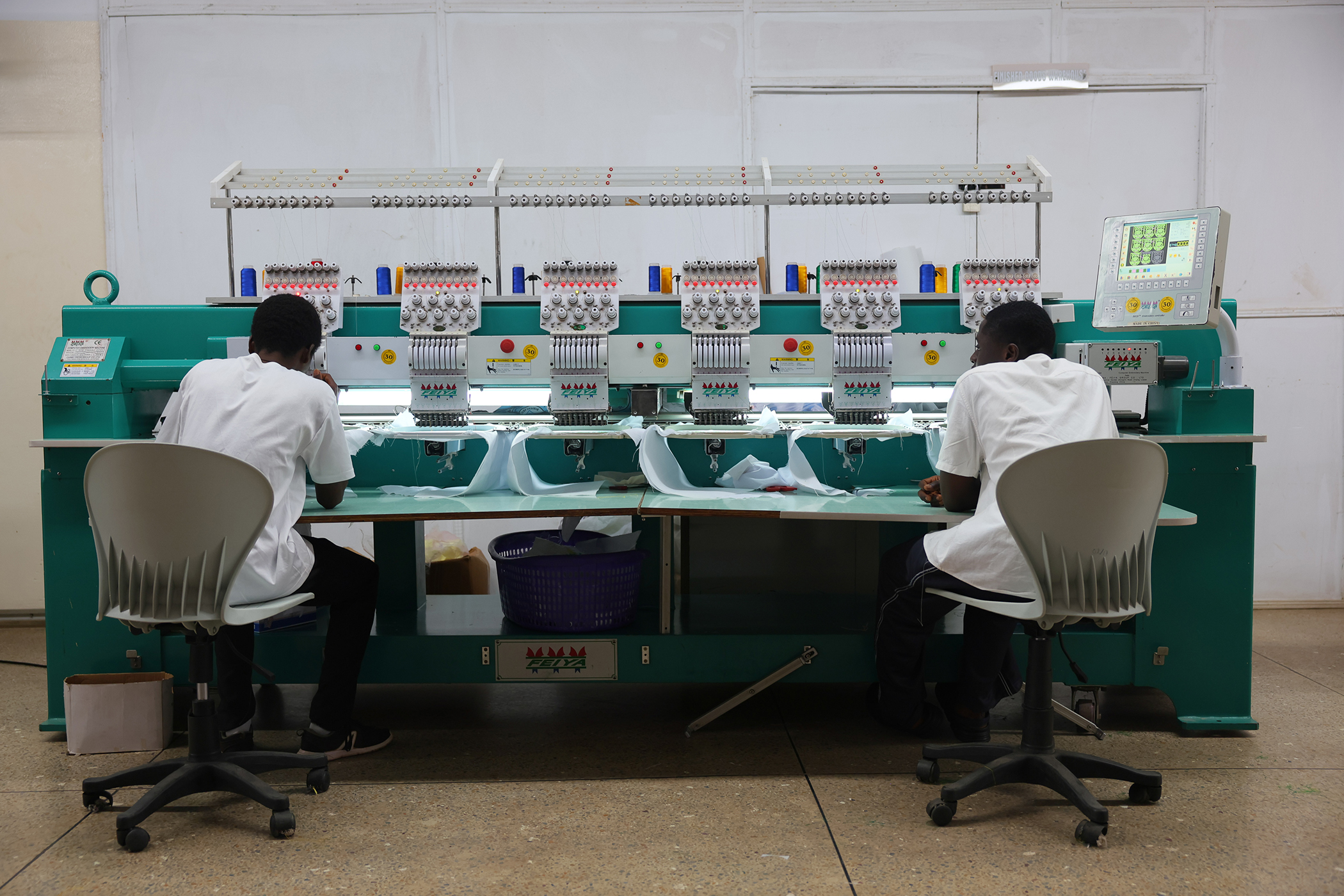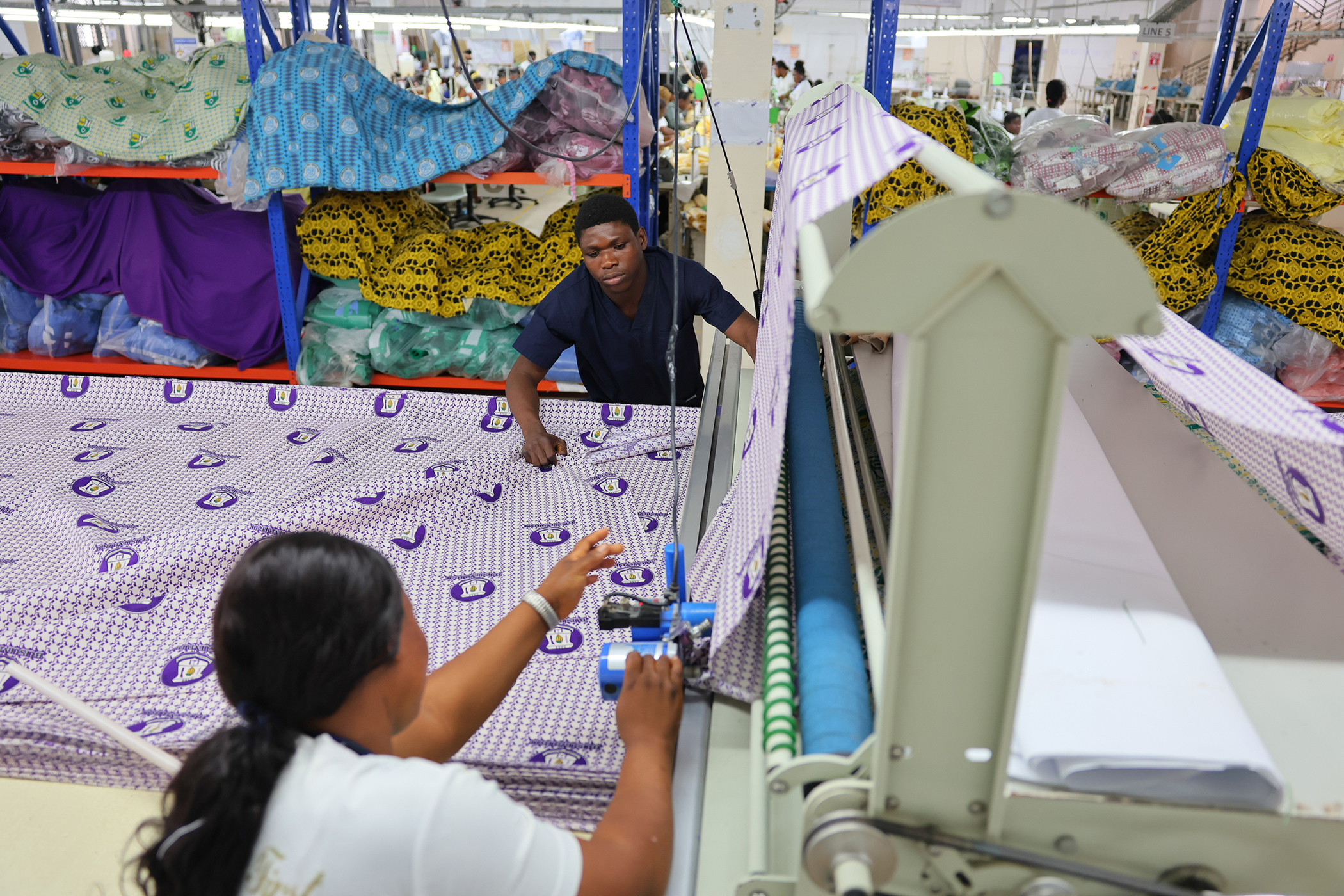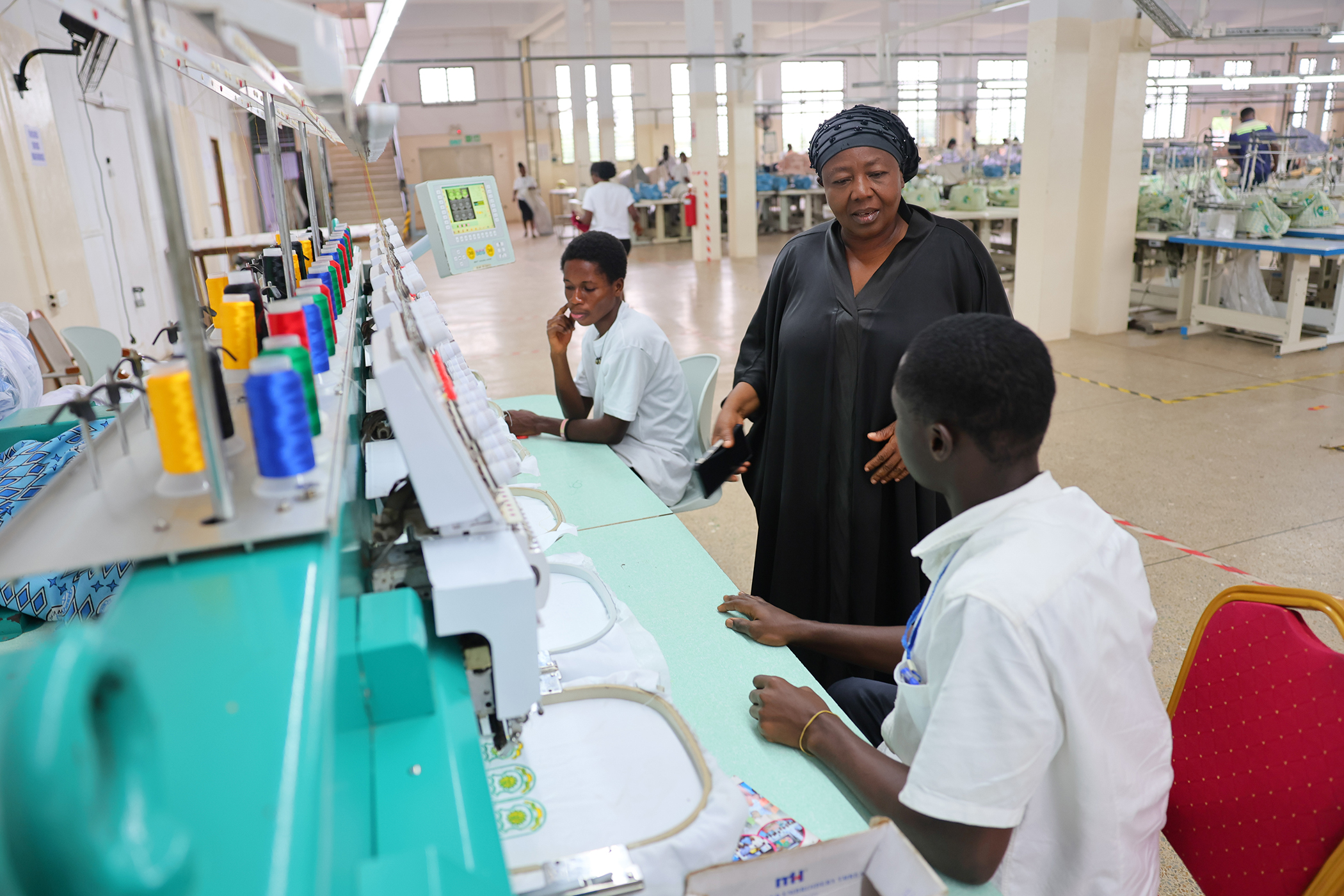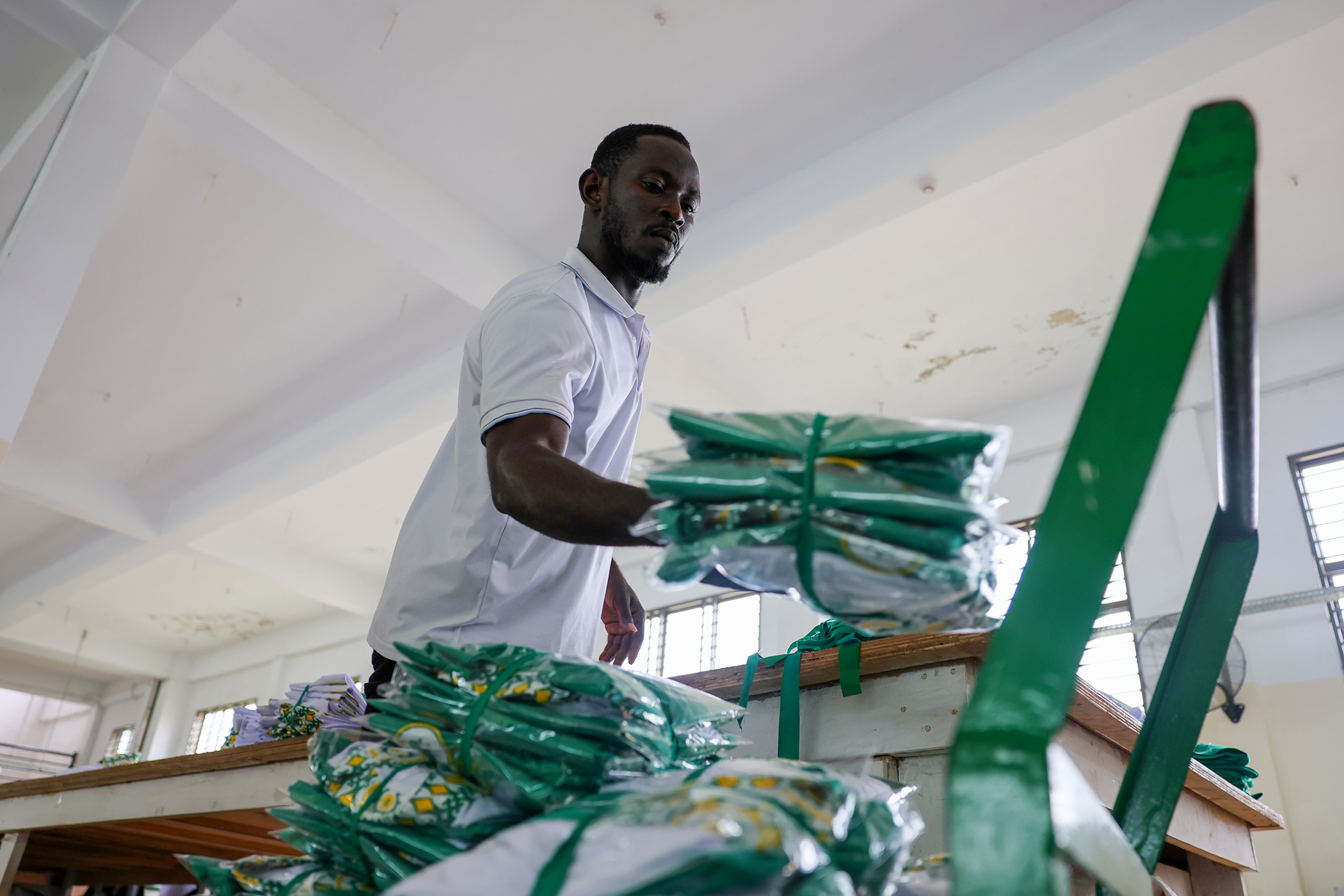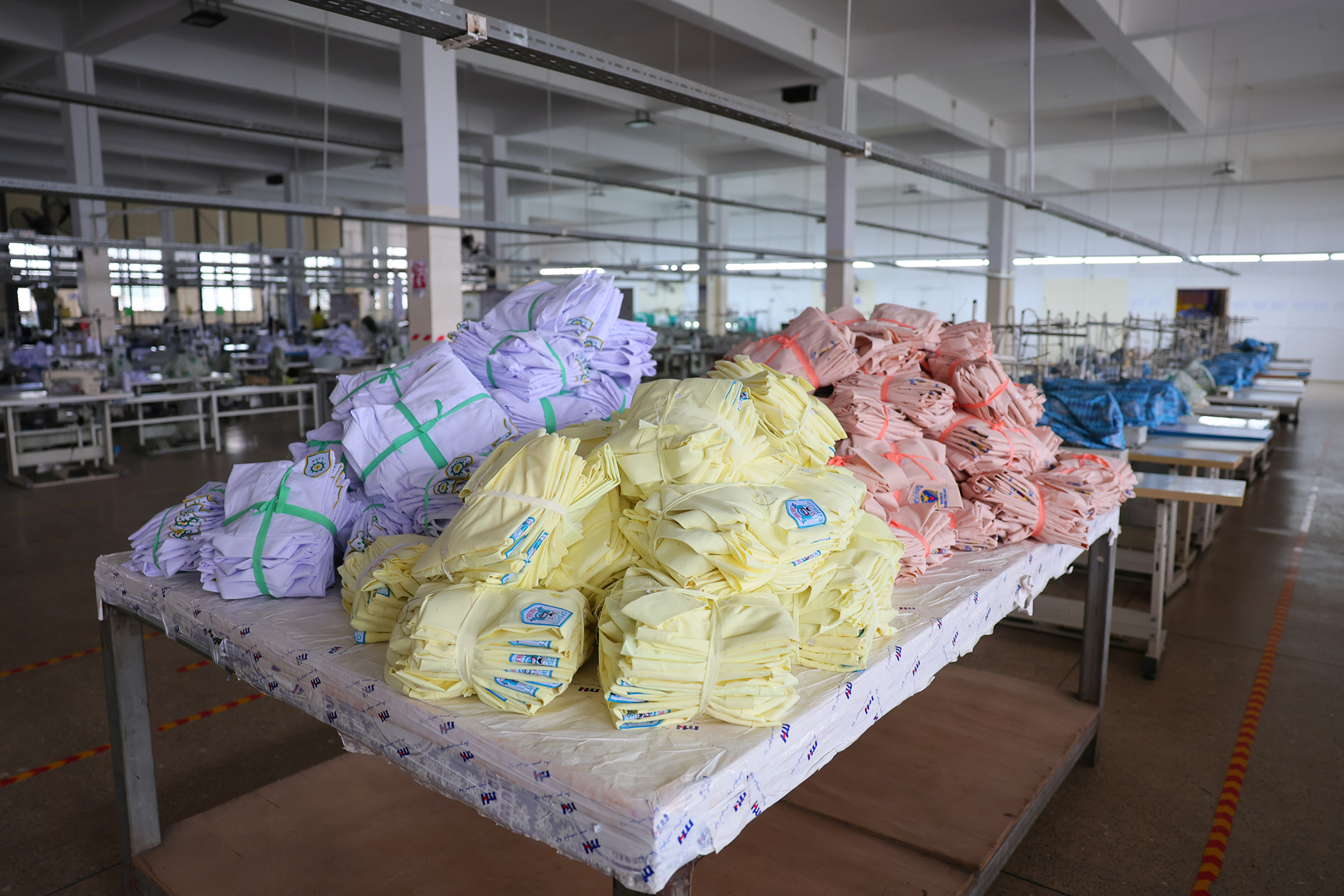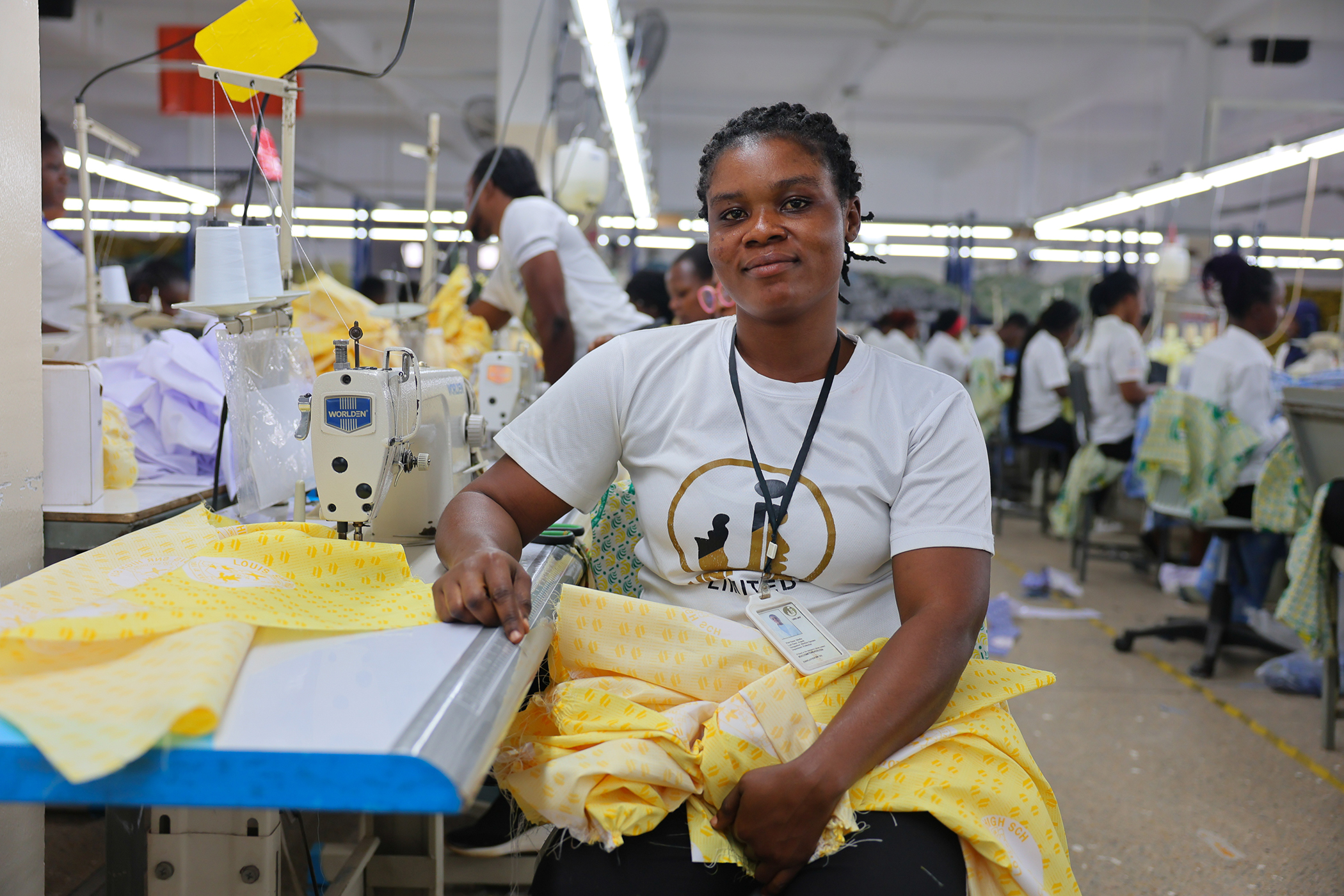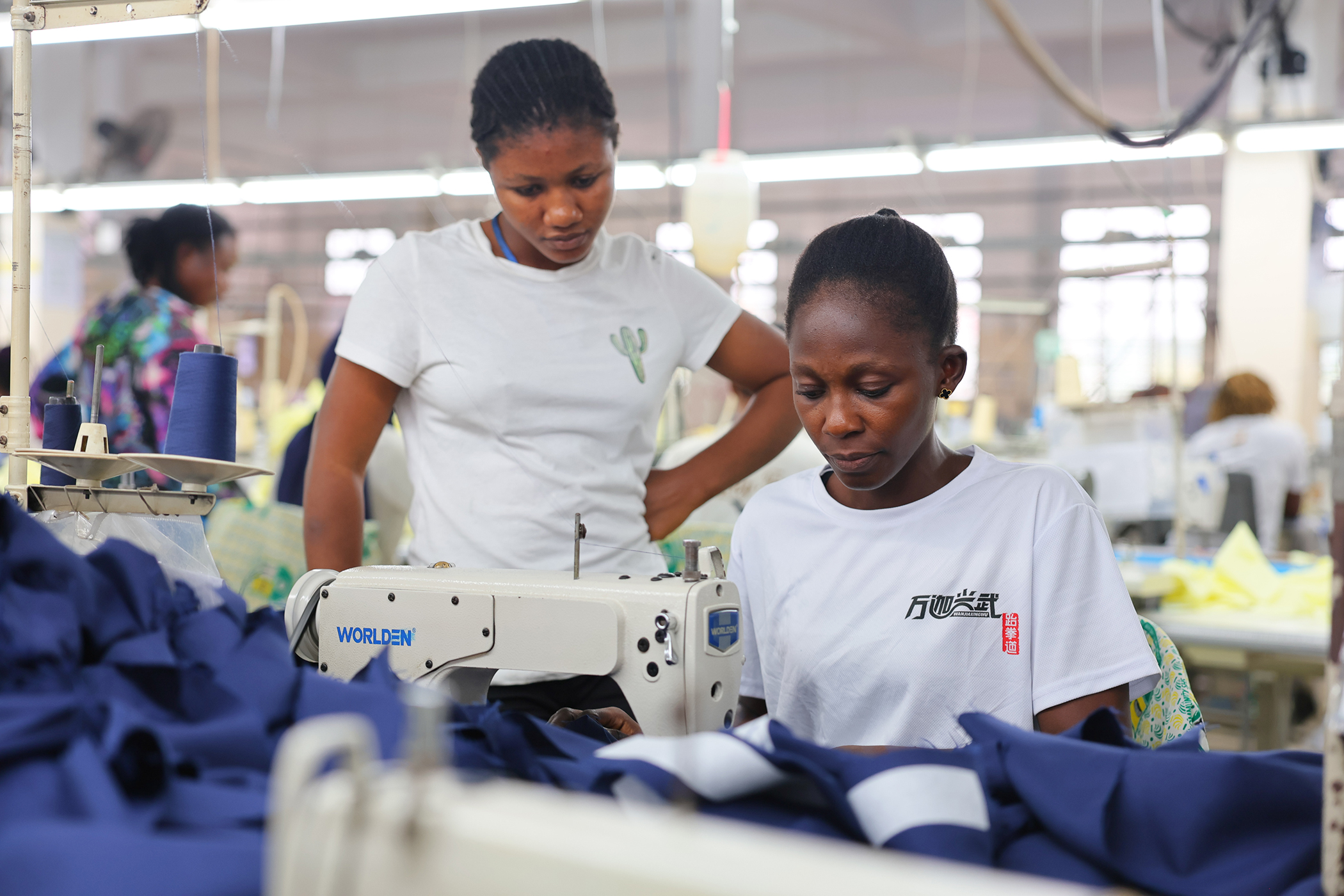In Kumasi, Ghana’s cultural capital, sewing machines hum. Skilled hands create with care, showcasing a lively (yet often overlooked) industry: garment manufacturing. This field has strong ties to handwoven textiles and local craftsmanship, and is evolving to complement the needs of a shifting market. Driving this evolution is a quiet yet strong force: the International Labour Organisation (ILO), which is working to help provide structure for the necessary changes in Kumasi's garment industry.
At Unijay Company Limited, one of Ghana's top garment factories, productivity is more than just speed; it’s a symphony of efficiency, employee satisfaction, and sustainable progress. As the world embraces ethical fashion and dignified work, the ILO shines a guiding light, helping factories like Unijay reshape their operations. From management training to enhancing worker well-being, Unijay is weaving a future where success through high-quality production and happiness through human-centered development blend delightfully together.
Let’s lean into how this international organization is partnering with local manufacturers to not only increase productivity and create quality products, but also uplift the lives of the people behind the machines. Because in Kumasi, as it should be globally, boosting output goes hand-in-hand with building dignity, community, and hope.
Kumasi’s Cultural Significance & History
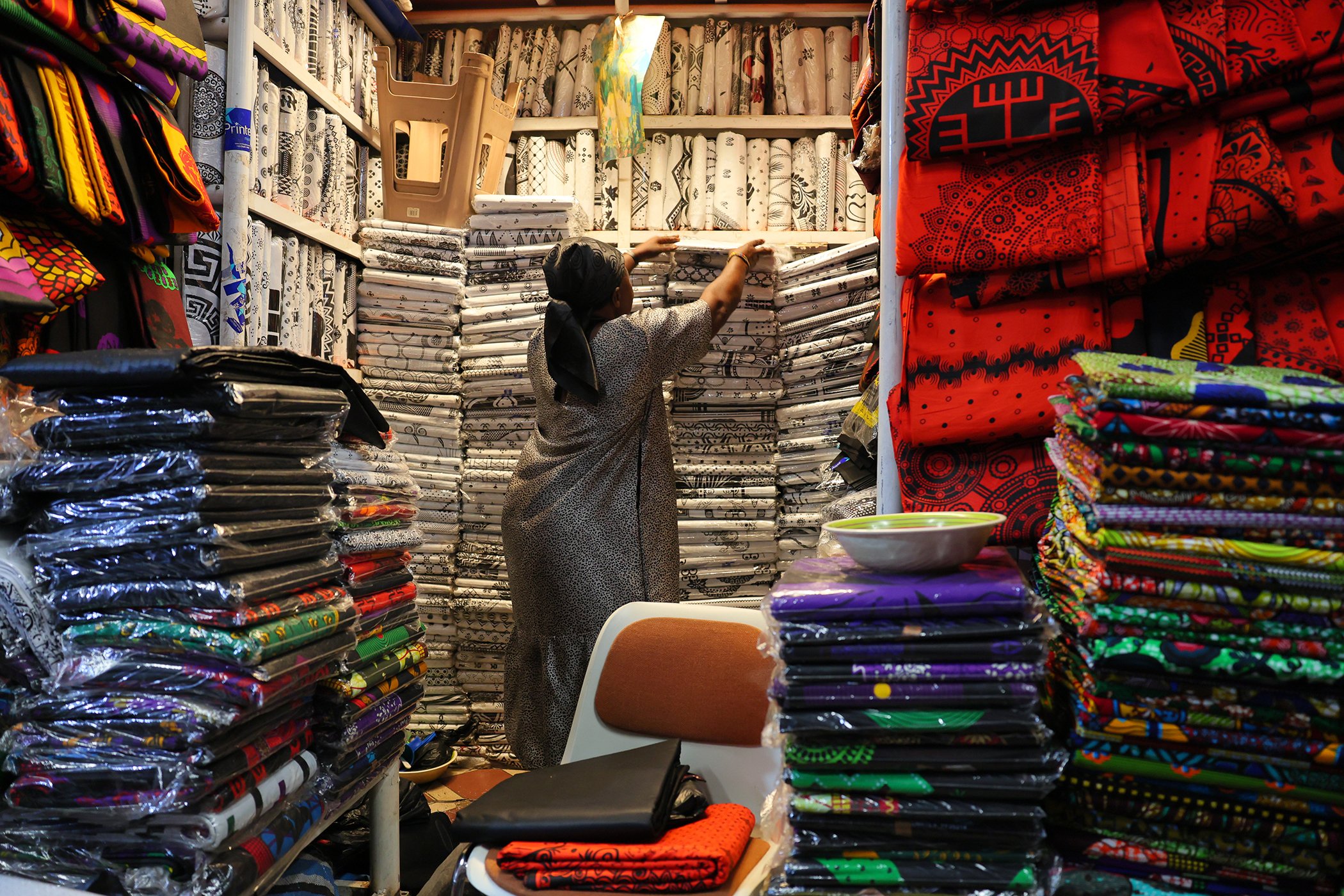 A vendor arranges piles of brightly dyed, locally made fabrics at the bustling Kejetia Market in Kumasi, Ghana, August 5, 2025.
A vendor arranges piles of brightly dyed, locally made fabrics at the bustling Kejetia Market in Kumasi, Ghana, August 5, 2025.
For decades, Kumasi has been renowned for its rich kente weaving traditions and the vibrant Kejetia Market. From funerals to festivals, the metropolis has always had clothing woven into its identity. Since the 19th century, visitors and buyers from across the world have traveled to Kumasi just for its vibrant garment scene. In fact, to date, Kumasi has become Ghana’s traditional textile destination owing to its popularity and business opportunities across sectors.
However, beyond the stalls of tailors and fabric traders lies a growing garment manufacturing sector that employs thousands of people, particularly women and young people. There is vast potential to grow to a globally competitive scale that benefits local communities; however, many factories face the barriers of operational inefficiencies, inconsistent quality standards, and limited investment in worker development.
In recent years, however, there’s been a shift. International attention on ethical sourcing and sustainable fashion has created an opening for Ghana’s garment sector to professionalise and scale. At the centre of this movement in Kumasi is Unijay, a local garment manufacturer redefining what productivity means in Africa’s fashion supply chain.
The Roots of Unijay
Since its establishment in 1983, Unijay has flourished into one of Ghana’s most award-winning garment manufacturers. The company, through its female-led founder, has employed over 300 workers, the majority of whom are women and young girls. Tucked away in the Ahodwo light industrial area, Unijay Garment Factory pulses with a steady energy. Inside, rows of apprentices work cheerfully, producing school and work uniforms, branded workwear, and garments for export.
“I spent less than a year learning to sew as an apprentice,” says Janet Abobigu, the brain behind Unijay Company. “I’d always wanted to be a teacher; however, because of financial constraints, I left that dream.”
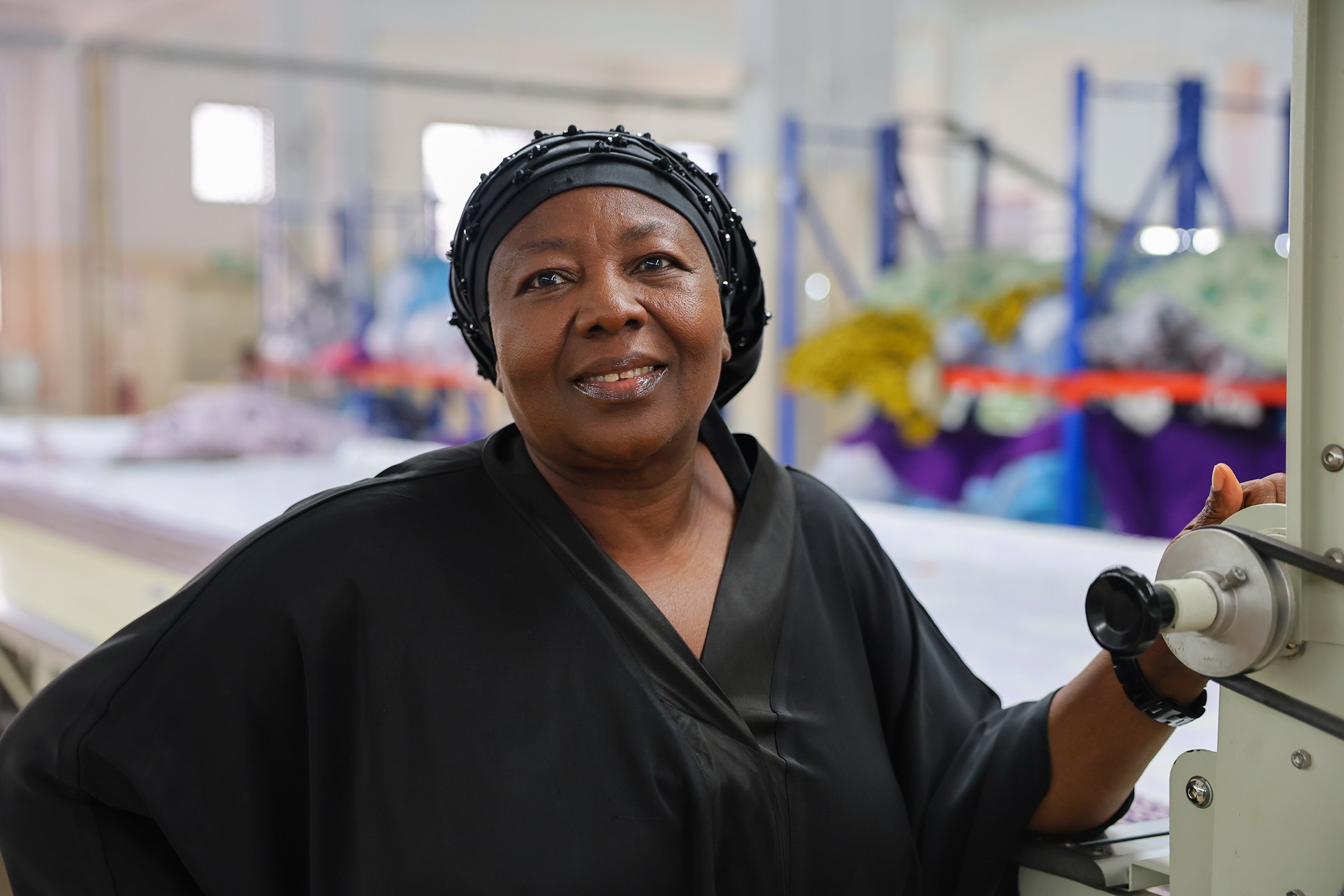 Janet Abobigu, directora ejecutiva de UNI Jay, fotografiada en la planta de producción en Kumasi, Ghana, el 4 de agosto de 2025.
Janet Abobigu, directora ejecutiva de UNI Jay, fotografiada en la planta de producción en Kumasi, Ghana, el 4 de agosto de 2025.
During the 19th century, friends and families returning home to Ghana from Europe brought with them fashion catalogs. These catalogs or magazines had clothing styles for women and served as Abobigu’s source of inspiration. “In those days, catalogs were scarce. I used to buy these catalogs because they gave me new ideas and inspiration to make sophisticated garments,” says Abobigu. Over the years, she developed a love for ethical fashion, beginning from when she used second-hand clothing to make new garments. “At the time when fabrics were scarce, I made new garments out of Obroni Wawu (second-hand clothing),” Abobigu details.
Abobigu learned the garment trade quickly and travelled across the world to attend trade shows with the help of His Majesty, Otumfuor Osei Tutu II. She gained several insights from the world of fashion in cities like London and Atlanta. During her apprenticeship in a garment factory in Liverpool, she worked on clothing cuttings which came in from India. “I learnt a lot from the garment industry in India because their handiwork was professional”, she says.
With the little money she saved from her trips and her apprenticeship in Liverpool, she returned to Kumasi, acquired a space, purchased sewing machines, and started Unijay. “I made a total of £15,000 through proceeds from my apprenticeship and sales made at exhibitions,” explains Abobigu. Over the years, the Unijay founder has received and trained many apprentices, focusing on upskilling one demographic in particular. “There were a lot of single mothers everywhere in Kumasi, so I decided to take them in,’’ she says. Today, these women have surpassed their training and have taken up spaces in flourishing enterprises within the garment industry in Kumasi.
Upskilling & Upscaling
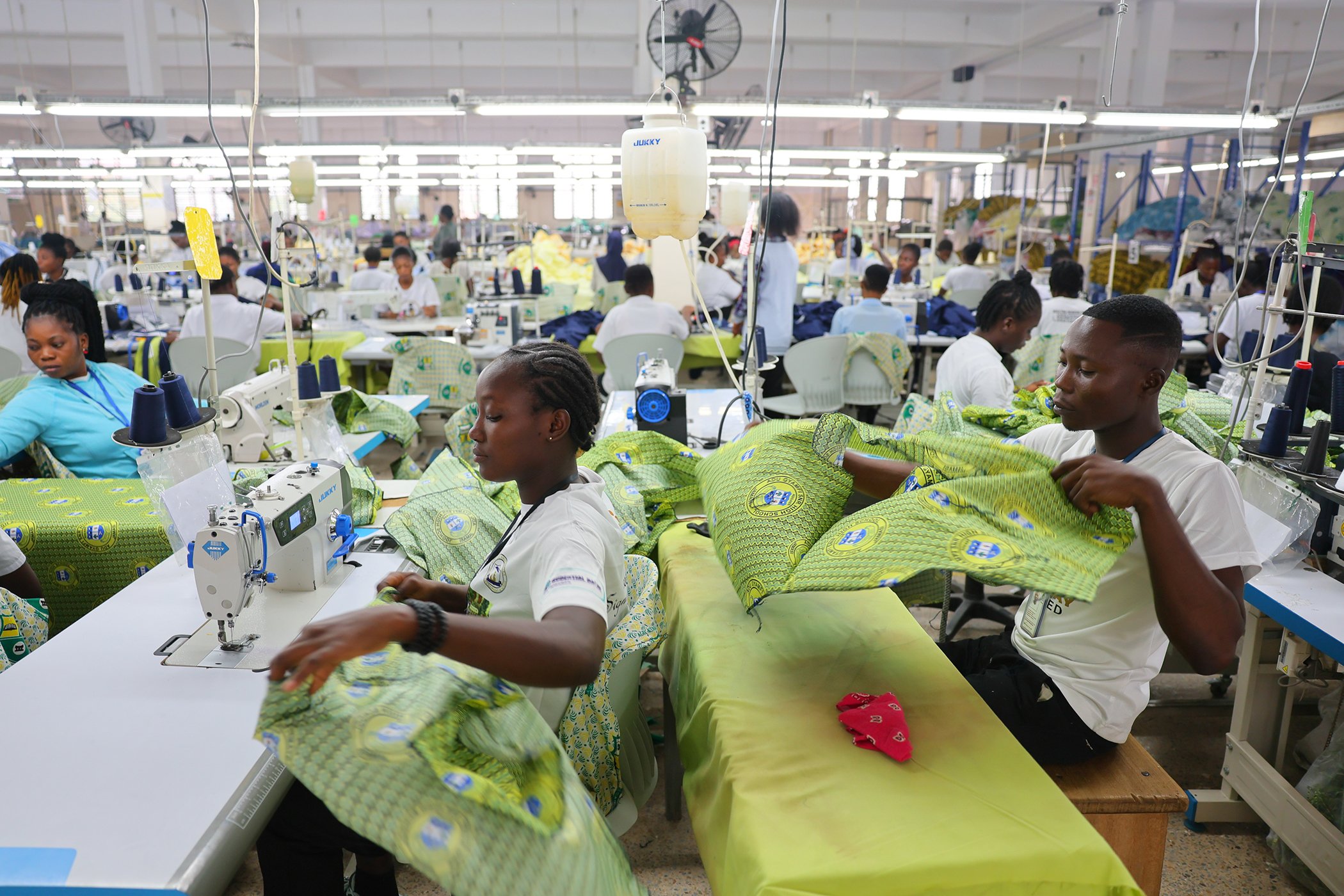 Workers cut, sew, and package garments on the UNI Jay production floor in Kumasi, Ghana, on August 4, 2025.
Workers cut, sew, and package garments on the UNI Jay production floor in Kumasi, Ghana, on August 4, 2025.
Like many Ghanaian SMEs, Unijay started operations without formal structures. Production targets were vague, supervision was inconsistent, and workers lacked structured training, among other professional work competencies. This began to change when the International Labour Organisation (ILO) partnered with the factory through the Productivity Ecosystems for Decent Work Project.
The ILO’s work in Ghana’s garment industry focuses on building productivity from the inside out. Unijay was selected by Productivity Ecosystems as Decent Work — an initiative financed by the governments of Norway and Switzerland — as one of the factories to receive tailored support in improving productivity, workplace cooperation, and working conditions. Unijay’s management functions benefited from the Sustaining Competitive and Responsible Enterprises (SCORE) methodology - a type of management coaching and advisory — and their industrial processes benefited from the support of ILO’s industrial engineers.
“I observed poor worker discipline and low productivity when I started working with Unijay,” recalls Udaya Gonsal, a Sri Lankan consultant, the latest engineer providing support to Unijay on behalf of the ILO. At the time of being interviewed by Global Citizen, Gonsal had been on the ground with Unijay for close to a week and managed to bring a considerable number of changes to the garment factory. “Within this short period, I’ve made a lot of changes. I set up structures like daily carder updates. We also created a separate room for the needle procedure as there wasn’t one before I came in,” says Gonsal.
As Unijay is beginning to look at exporting garments, discipline and productivity are some of the things the ILO is helping the workers improve upon, even at the local market level. The ILO, through its Productivity Ecosystems for Decent Work project, holds workshops for the senior management of the factory. “The ILO’s training programs have helped us in so many ways, especially as we’re looking to export,’’ Abobigu explains.
She adds: “We have all the machines and the workforce, but what we lack is the technical know-how to scale the factory.” One standout improvement is the factory’s layout. With the ILO’s guidance, Unijay restructured its production line to reduce movement and eliminate bottlenecks, a move that significantly reduced production time.
Workers and senior management of the factory have benefited greatly from the workshops given by the ILO. “We attend the ILO’s trainings and workshops; however, having Mr Udaya physically present at the factory has gone a long way to speed up productivity,’’ says Abobigu.
The ILO has extended its efforts to other parts of the garment sector within the Kumasi metropolis. Akaal Skills Development Academy is one such beneficiary. The school has trained over 1,000 apprentices and master craftsmen to serve in the garment industry in Ghana.
“Thanks to the ILO’s training, we’ve incorporated occupational safety, improved productivity and increased worker and company involvement. Since the ILO came in to support, our trainees and workers have become part of the business,’’ says the school’s CEO, Hawah Braimah.
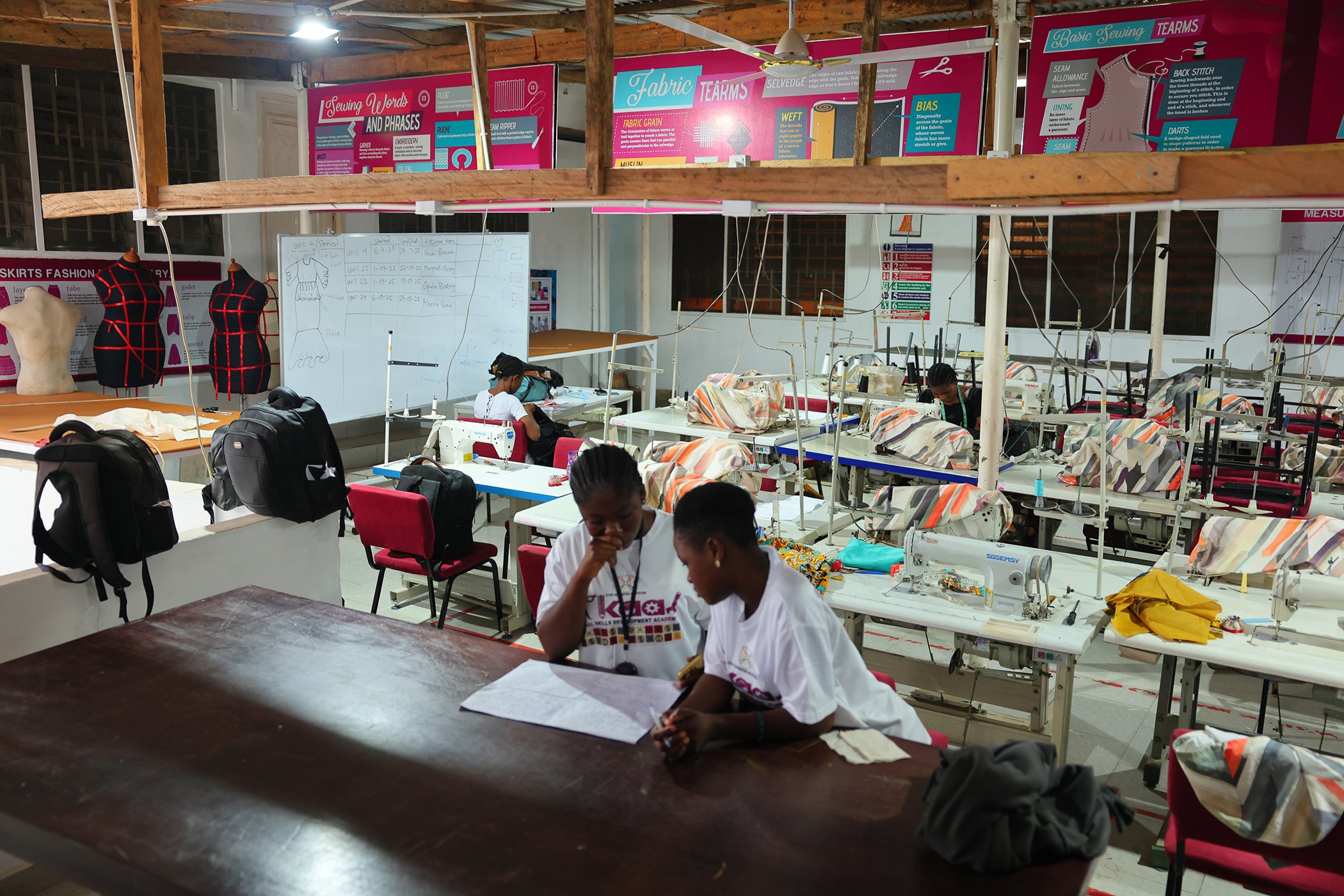 Fashion design students at the Akaal Skills Development Academy in Kumasi, Ghana, on August 5, 2025.
Fashion design students at the Akaal Skills Development Academy in Kumasi, Ghana, on August 5, 2025.
The Voices Inside The Factory
At Unijay, there are over 300 workers of varying ages, work experiences, and backgrounds. A day at Unijay starts from early in the morning and ends after 3 p.m. The factory shuttle picks workers up from their various residences as early as 7:45 a.m. Workers, together with apprentices, have breakfast at 8 a.m., right after which work commences. Workers and apprentices are assigned targets for the day for each section. At the sound of the bell, which rings at noon, everyone jolts out of the factory to eat their packed lunches. The compound is filled with young men and women in uniform, beaming as they replenish their energy at the midday mark.
“I have been working with Unijay for 29 years. Before the ILO came in to help, our productivity was slow; however, after their training, I’ve seen a huge improvement in our work. I have also benefited from the women empowerment program the ILO organised a few weeks ago in Accra,” says Anita Wiafe, a senior staff member at Unijay.
Today, many of the workers and apprentices have become part of the business as a result of the ILO improving working conditions at Unijay. “Before joining Unijay, I used to make clothes; however, I didn’t own a sewing machine. Today, after a year, I have learned a lot, especially from the CEO, and my skills have improved,” says Martha Ankrah, a worker in her 20s.
“When I completed high school, things were tough, a friend introduced me to Unijay and within a few months, I’m beginning to find my feet,” says Faustina Nyarko, a 20-year-old worker.
The ILO’s intervention has resulted in a significant positive impact on the quality of these workers’ employment. This impact is especially noteworthy for women, who make up a majority of the staff. Some have advanced from stitching to cutting, and even to supervisory roles, gaining both income and leadership experience.
What The Future Looks Like
What’s happening in Kumasi didn’t start today. It’s a result of many years of consistency and determination. At Unijay, the future looks big and bright. Unijay is a mere glimpse into what’s possible for Africa’s garment community. As governments push for industrialization and global brands seek more transparent supply chains, productivity models like Unijay’s could set the tone for a new era of African manufacturing.
“We’re looking to expand and export to other markets outside Africa. I am growing and I need a system to take control of running the factory so I can take a step back,” says Abobigu, who considers the ILO an integral part of these next steps.
As the garment industry in Ghana continues to scale, stories like Unijay’s and others show that boosting productivity is possible and should go together with improving lives, rather than sacrificing quality of life for the sake of productivity. In Kumasi, the future of fashion is being stitched together, not just with fabric, but with determination, care, and vision.
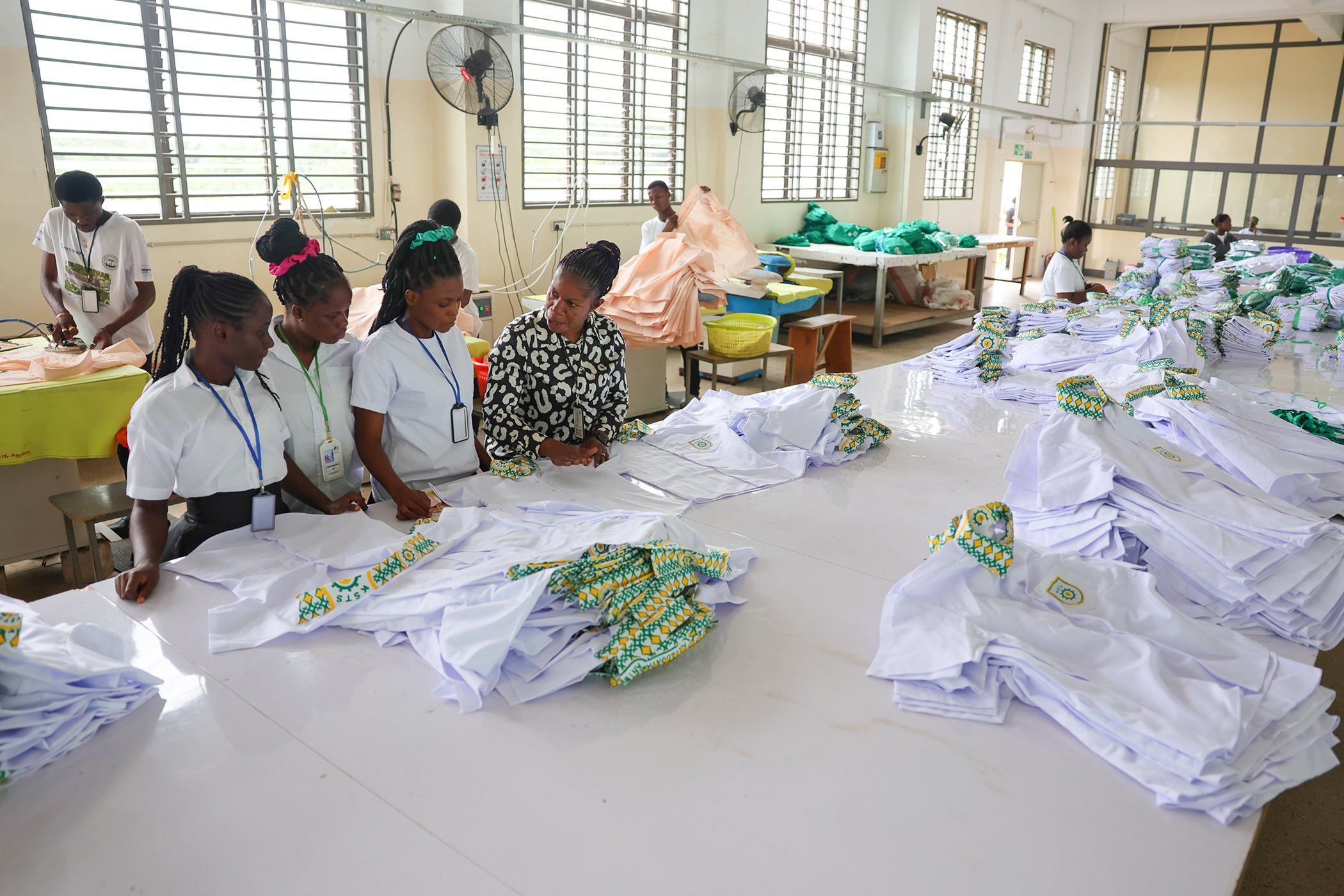 Senior staff member Anita Wiafe supervises and guides workers at the UNI Jay factory in Kumasi, Ghana, on August 4, 2025.
Senior staff member Anita Wiafe supervises and guides workers at the UNI Jay factory in Kumasi, Ghana, on August 4, 2025.
Editor’s Note: This article is part of Global Citizen's original reporting, made possible by funding from the International Labour Organisation (ILO).
